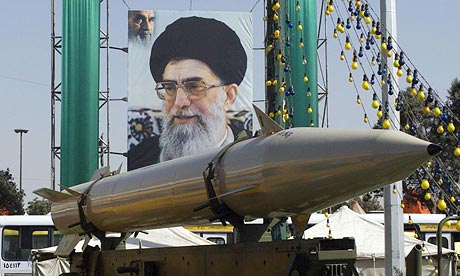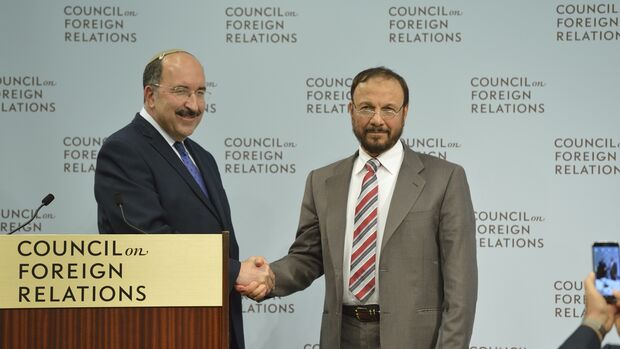
...Two days ago [4 June 1967] Israel's condition caused much concern across the humane and friendly world. Israel had reached a sombre hour. Let me try to evoke the point at which our fortunes stood.
An army, greater than any force ever assembled in history in Sinai, had massed against Israel's southern frontier. Egypt had dismissed the United Nations forces which symbolized the international interest in the maintenance of peace in our region. Nasser had provocatively brought five infantry divisions and two armoured divisions up to our very gates; 80,000 men and 900 tanks were poised to move.
A special striking force, comprising an armoured division with at least 200 tanks, was concentrated against Eilat at the Negev's southern tip. Here was a clear design to cut the southern Negev off from the main body of our State. For Egypt had openly proclaimed that Eilat did not form part of Israel and had predicted that Israel itself would soon expire. The proclamation was empty; the prediction now lies in ruin. While the main brunt of the hostile threat was focussed on the southern front, an alarming plan of encirclement was under way. With Egypt's initiative and guidance, Israel was already being strangled in its maritime approaches to the whole eastern half of the world. For sixteen years, Israel had been illicitly denied passage in the Suez Canal, despite the Security Council's decision of 1 September 1951 [Resolution 95 (1951)]. And now the creative enterprise of ten patient years which had opened an international route across the Strait of Tiran and the Gulf of Aqaba had been suddenly and arbitrarily choked. Israel was and is breathing only with a single lung.
Jordan had been intimidated, against its better interest, into joining a defence pact. It is not a defence pact at all: it is an aggressive pact, of which I saw the consequences with my own eyes yesterday in the shells falling upon institutions of health and culture in the City of Jerusalem. Every house and street in Jerusalem now came into the range of fire as a result of Jordan's adherence to this pact; so also did the crowded and pathetically narrow coastal strip in which so much of Israel's life and population is concentrated.
Iraqi troops reinforced Jordanian units in areas immediately facing vital and vulnerable Israel communication centres. Expeditionary forces from Algeria and Kuwait had reached Egyptian territory. Nearly all the Egyptian forces which had been attempting the conquest of the Yemen had been transferred to the coming assault upon Israel. Syrian units, including artillery, overlooked the Israel villages in the Jordan Valley. Terrorist troops came regularly into our territory to kill, plunder and set off explosions; the most recent occasion was five days ago.
In short, there was peril for Israel wherever it looked. Its manpower had been hastily mobilized. Its economy and commerce were beating with feeble pulses. Its streets were dark and empty. There was an apocalyptic air of approaching peril. And Israel faced this danger alone.
We were buoyed up by an unforgettable surge of public sympathy across the world. The friendly Governments expressed the rather ominous hope that Israel would manage to live, but the dominant theme of our condition was danger and solitude.
Now there could be no doubt about what was intended for us. With my very ears I heard President Nasser's speech on 26 May.

He said:
"We intend to open a general assault against Israel. This will be total war. Our basic aim will be to destroy Israel."
On 2 June, the Egyptian Commander in Sinai, General Mortagi, published his Order of the Day, calling on his troops to wage a war of 'destruction against Israel. Here, then, was a systematic, overt, proclaimed design at politicide, the murder of a State.
The policy, the arms, the men had all been brought together, and the State thus threatened with collective assault was itself the last sanctuary of a people which had seen six million of its sons exterminated by a more powerful dictator two decades before....
As we pursued this avenue of international solution, we wished the world to have no doubt about our readiness to exhaust every prospect, however fragile, of a diplomatic solution - and some of the prospects that were suggested were very fragile indeed...
...But as time went on, there was no doubt that our margin of general security was becoming smaller and smaller. Thus, on the morning of 5 June, when Egyptian forces engaged us by air and land, bombarding the villages of Kissufim, Nahal-Oz and Ein Hashelosha we knew that our limit of safety had been reached, and perhaps passed. In accordance with its inherent right of self-defence as formulated in Article 51 of the United Nations Charter, Israel responded defensively in full strength. Never in the history of nations has armed force been used in a more righteous or compelling cause.
Even when engaged with Egyptian forces, we still hoped to contain the conflict. Egypt was overtly bent on our destruction, but we still hoped that others would not join the aggression. Prime Minister Eshkol, who for weeks had carried the heavy burden of calculation and decision, published and conveyed a message to other neighbouring States proclaiming:
"We shall not attack any country unless it opens war on us. Even now, when the mortars speak, we have not given up our quest for peace. We strive to repel all menace of terrorism and any danger of aggression to ensure our security and our legitimate rights."...
...But the central point remains the need to secure an authentic intellectual recognition by our neighbours of Israel's deep roots in the Middle Eastern reality. There is an intellectual tragedy in the failure of Arab leaders to come to grips, however reluctantly, with the depth and authenticity of Israel's roots in the life, the history, the spiritual experience and the culture of the Middle East.
This, then, is the first axiom. A much more conscious and uninhibited acceptance of Israel's statehood is an axiom requiring no demonstration, for there will never be a Middle East without an independent and sovereign State of Israel in its midst.
The second principle must be that of the peaceful settlement of disputes. The Resolution thus adopted falls within the concept of the peaceful settlement of disputes. I have already said that much could be done if the Governments of the area would embark much more on direct contacts. They must find their way to each other. After all, when there is conflict between them they come together face to face. Why should they not come together face to face to solve the conflict? And perhaps on some occasions it would not be a bad idea to have the solution before, and therefore instead of, the conflict....
Follow the link to read the full speech




